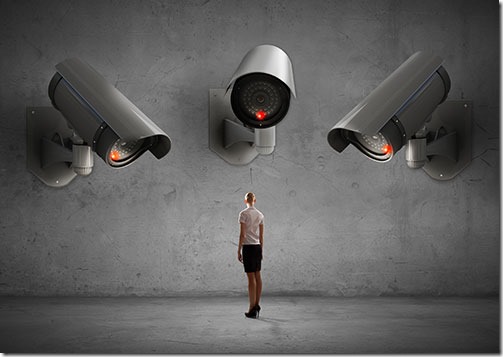
A series of articles about privacy and trust in the era of tech overlords.
• Part 1: Data about you is being gathered by the big tech companies (as well as many other companies) in startling ways. Their ability to analyze that data and predict your behavior is more like magic than technology – and it has the potential to change the world, for better or worse.
• TODAY: It is impossible for us to detach from the big tech companies or prevent that data from being collected.
• Although the scale of data-gathering is unprecedented, there is nothing new about big companies observing our behavior and it is not necessarily an invasion of privacy.
• Some acts by the tech companies absolutely do invade our privacy; well-considered regulation can help protect our privacy.
• Our individual decisions about the big tech companies should be driven by trust and transparency, not unfocused angst about invasions of privacy.
Private eyes, they’re watching you, they see your every move
We don’t have to come up with hypotheticals. We have a real world experiment that tells you exactly what it means to attempt to disengage from big tech company surveillance. Gizmodo reporter Kashmir Hill spent six weeks blocking Google, Facebook, Amazon, Microsoft and Apple from getting her money, data and attention. Each week she set up a technical block that prevented any of her devices from accessing IP addresses for one of those companies. Her story of what happened is instructive (and very entertaining reading).
The short answer: The tech companies are so embedded in each of our lives, and into the infrastructure of modern life and the business models of so many companies, that it is simply not feasible to close yourself off from them, even if you wish they weren’t collecting data about you.
If you cut yourself off from Amazon, you will quickly discover how dependent you are on the convenience of shopping there. But even if you stop shopping, Amazon will still be slurping up data about you unless you stop using services hosted behind the scenes by Amazon Web Services – including Netflix, Airbnb, HBO Go, apps like Words With Friends, and so many more websites and services hosted by AWS. Oh, and you’ll have to unplug your Echos and put your Kindles away.
Facebook? If you’re going to leave Facebook, you’re also going to have to cut yourself off from Instagram, Whatsapp, and Facebook Messenger, plus any apps that you log into with your Facebook credentials. But that won’t stop Facebook from building a database about you from information uploaded by others – contact information from someone who uploads their address book, and posts and pictures from anyone who identifies you or tags you. Facebook has trackers on over two million websites, sending back information to Facebook that it can use to deliver targeted ads.
The headline above tells you everything you need to know about the attempt to sever ties with Google: “I cut Google out of my life. It screwed up everything.” Imagine giving up Chrome, Google searches, Gmail, Google Maps, your Android phone, Google Photos, Uber & Lyft (the apps depend on Google Maps), Spotify (Google Cloud hosts the files), countless websites that function poorly or break if their connection to Google web services are disrupted, Dropbox (relies on Google to evaluate whether a real person is logging in), and, well, just about everything.
Microsoft and Apple each scoop up data wholeheartedly. If you use a Windows computer, it is sending back information to Microsoft continuously, even if you turn on every privacy option and turn off all tracking. I happen to think Microsoft uses Windows telemetry information responsibly, but of course it has much more detailed and personally identifiable data if your business uses Office 365 for email, or if you log in with a Microsoft account, or if your business hosts data with Azure.
Apple boasts frequently about its deep concern with privacy. There is some truth to that – but we’ll come back to it later. There may be less to that story than you think.
You get the idea. If you’re going to live in the real world in 2019, you’re going to use, say, Google Maps, or you’re going to handicap yourself in pursuit of some ideal that makes life much more difficult, and for which there is no real reward, because it barely slows down the data collection.
It’s not just the big tech companies
The big five tech companies have a commanding lead in using AI to analyze data about our behavior and draw inferences and make predictions. Our attention is correctly focused on them for now, as we internalize this data surveillance and consider whether to regulate it.
But think about this before you decide to quit Facebook in a huff.
If you turn off all the tracking and location apps and features on your phone, the cell carriers can and do still track your location continuously by recording the cell towers that your phone connects to.
If you stop using any services from the big tech companies and surf exclusively in incognito mode, your ISP still knows every website you visited, and might have installed equipment that can identify every specific web page you see.
Every click you make online goes through your ISP’s servers. Your ISP knows every web page you visit. Your ISP knows how many devices you have. It knows where you bank. It knows what you buy online. Sophisticated data analysis can likely reveal your religion and sexual orientation. They can identify how many children you have and where they go to school. If you visit a health website after you wake up, the ISP can guess that you’re not feeling well and see what you looked up.;
Do you ever use your browser’s incognito mode? When you browse in incognito mode, there is no record on your computer or mobile device about what websites you visit. You might feel safe using that to view pornography or to conduct personal business without leaving a trail for your spouse or partner. Google does not keep a record of your incognito browsing. But it’s completely visible to your ISP, which will log it along with all of its other information about you.
And your ISP can match the data it collects with your personally identifiable information (PII): the ISP has your name, your physical address for home or business connections, and your social security number. Mobile carriers like Verizon and AT&T also have a record of the location of your phone at all times, 24 hours a day, regardless of what apps you’re running, by tracking the cell phone towers that your phone is near.
Your ISP scans every packet of information going to and from your computer. Comcast and the others have already installed the equipment to do “deep packet inspection” – a surveillance method that literally opens and examines the contents of all the data going to and from your computer or device.
The EFF summarizes it this way: “It’s worth remembering that ISPs and companies like Google or Facebook see entirely different parts of your Internet activity; namely that Google or Facebook only see the traffic you send to their servers, while ISPs see all your traffic. Even when you take into account the fact that Google and Facebook have creepy third-party trackers spread across the web, they still only see a fraction of what your ISP sees. Being able to see all of your traffic gives your ISP an unprecedented view into your life (everything from what you’re shopping for, to who you talk to, to what your politics are, to what you read), which not even Google or Facebook can achieve.”
Wait. What? Is it hopeless? Are we doomed to be tracked continuously?

Golly, hate to be the bearer of bad tidings, but – well, yes, that’s exactly the point.
The genie is out of the bottle. Nothing can stop the tech companies from studying every scrap of data about our interactions with their equipment and services. We can throw up little roadblocks here and there. We’ll talk more about those later. But big companies, small companies, and governments are all figuring out how valuable it can be to watch us closely – and there are lots of opportunities to watch us closely.
Surprised? Horrified? Oh, come on. You carry around a device 24/7 with a camera, a microphone, and a GPS chip that tracks your location. Most places you go in public have cameras recording continuously. It’s way too late to be surprised that you’re being recorded and studied and analyzed.
NEXT:
The scale of the surveillance has changed but we’re been observed for a long time. Maybe “privacy” isn’t quite the right framework to think about this.


Trackbacks/Pingbacks